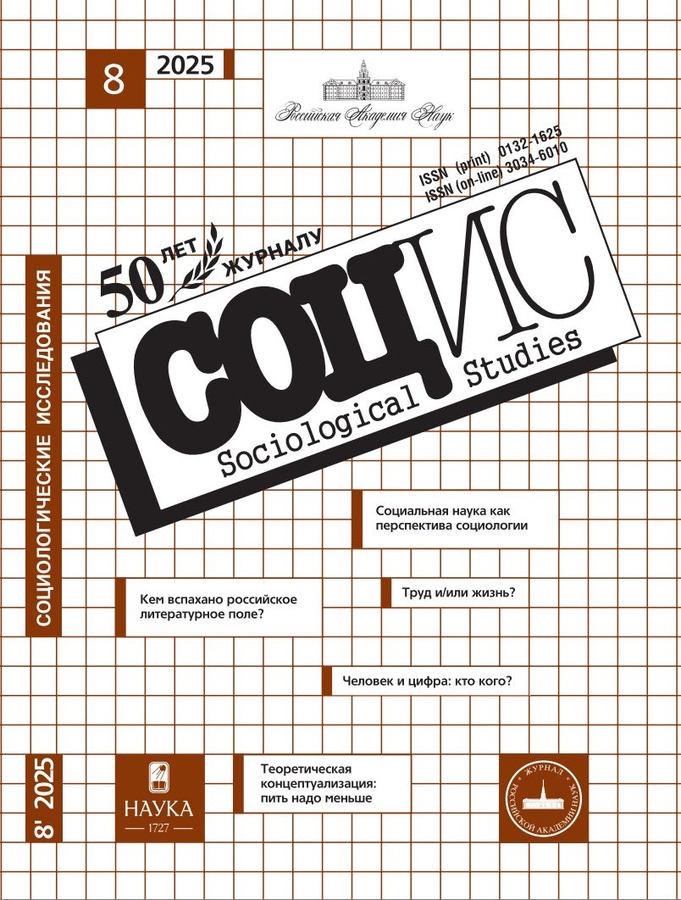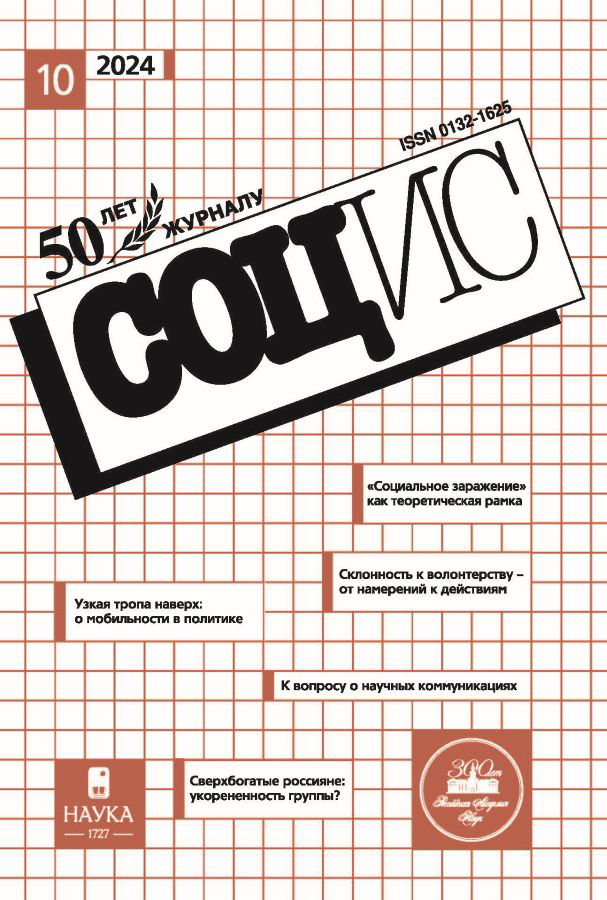Последствия развития открытой науки: риски усиления неравенства в глобальной научной коммуникации
- Авторы: Карих Р.Д.1
-
Учреждения:
- НИУ «Высшая школа экономики»
- Выпуск: № 10 (2024)
- Страницы: 93-103
- Раздел: СОЦИОЛОГИЯ НАУКИ
- URL: https://cijournal.ru/0132-1625/article/view/661971
- DOI: https://doi.org/10.31857/S0132162524100082
- ID: 661971
Цитировать
Полный текст
Аннотация
В мире продолжает распространяться концепция открытой науки, которая представляет собой борьбу за свободный доступ к научным знаниям. В качестве одной из целей она ставит решение проблем развивающихся стран и ослабление неравенства. В данной работе достижимость этой цели ставится под сомнение. Представляя науку как мир-систему, автор описывает ее устройство в формате академического колониализма, где страны глобального Севера, находящиеся в центре мир-системы, доминируют над странами глобального Юга, расположенными ближе к периферии. Следствием такой модели является эпистемическая несправедливость, которая может быть снижена в условиях открытой науки. Однако современные неолиберальные тенденции в виде платформенного капитализма не позволяют справиться с этой проблемой в рамках концепции в ее текущем виде, а увеличивают риски усиления неравенства. В статье предлагаются возможные решения по реализации открытой науки в России в инклюзивной форме на основе концепции библиоразнообразия.
Полный текст
Об авторах
Роман Дмитриевич Карих
НИУ «Высшая школа экономики»
Автор, ответственный за переписку.
Email: rkarikh@hse.ru
аспирант, стажер-исследователь Международной лаборатории исследований социальной интеграции
Россия, МоскваСписок литературы
- Галявиева М. С. Научные библиотеки в условиях открытого доступа // Ученые записки Института социальных и гуманитарных знаний. 2016. № 1 (14). C. 134–140. [Galjavieva M. S. (2016) Scientific libraries in conditions of open access. Uchenye zapiski Instituta sotsialnykh i gumanitarnykh znanii. [Academic Notes of the Institute of Social and Humanitarian Knowledge] No. 14: 134–140. (In Russ.)]
- Засурский И. И., Трищенко Н. Д. Инфраструктура открытой науки в России и мире // Научные и технические библиотеки. 2019. № 4. С. 84–100. [Zasurskiy I. I., Trishchenko N. D. (2019) The open science infrastructure in Russia and the world. Nauchnie i tehnicheskie biblioteki [Scientific and Technical Libraries]. No. 4: 84–100. (In Russ.)]
- Зубофф Ш. Эпоха надзорного капитализма. Битва за человеческое будущее на новых рубежах власти. М.: Ин-т Гайдара, 2022. [Zuboff Sh. (2022) The Age of Surveillance Capitalism. The Fight for a Human Future at the New Frontier of Power. Moscow: In-t Gaidara.]
- Карих Р. Д. Анализ дискуссии на тему открытой науки в российском научном поле // Социология науки и технологий. 2023. № 2 (14). С. 173–193. [Karikh R. D. (2023) Analysis of the discussion on open science in the Russian scientific field. Sotsiologiia nauki i tekhnologii [Sociology of Science and Technology]. No. 4: 52–71. (In Russ.)]
- Карих Р. Д. Трансформация роли библиотек в условиях открытой науки // Вестник СПбГУ. Социология. 2024. № 1 (17). С. 100–115. [Karikh R. D. (2024) Transformation of the role of libraries in the Open Science. Vestnik SPbGU. Sociologiya [Bulletin of St. Petersburg State University. Sociology]. No. 1: 100–115. (In Russ.)]
- Клеева Л. П., Максимов С. В. «Открытая» наука: критический анализ нового проекта ЮНЕСКО // Российское конкурентное право и экономика. 2021. № 1 (25). С. 22–29. [Kleeva L. P., Maksimov S. V. (2021) Open Science: a Critique of a New UNESCO Project. Rossiiskoe konkurentnoe parvo i ekonomika [Russian competition law and economy]. No. 1: 22–29. (In Russ.)]
- Мертон Р. Эффект Матфея в науке, II: накопление преимуществ и символизм интеллектуальной собственности // THESIS. 1993. № 3. С. 256–276. [Merton R. (1993) The Matthew Effect in Science, II: Cumulative Advantage and the Symbolism of Intellectual Property. THESIS. No. 79: 256–276. (In Russ.)]
- Москалева О. В., Акоев М. А. Геополитика и публикационная стратегия. Есть ли связь? // Научный редактор и издатель. 2024. № 9 (1). [Moskaleva O. V., Akoev M. A. (2024) Geopolitics and publication strategy. Is there a dependance? Nauchniy redactor i izdatel [Science Editor and Publisher]. No. 9 (1). (In Russ.)]
- Срничек Н. Капитализм платформ. М.: ВШЭ, 2019. [Srnicek N. (2019) Platform Capitalism. Moscow: VSHE. (In Russ.)]
- Шугуров М. В. Оценка санкций в отношении российской науки зарубежными исследователями: многообразие подходов // Управление наукой и наукометрия. 2023. Т. 18. № 4. С. 578–612. [Shugurov M. V. (2023) Assessment of Sanctions against Russian Science by Foreign Researchers: Diversity of Approaches. Upravlenie naukoi i naukometriya [Science Governance and Scientometrics]. No. 18: 578–612. (In Russ.)]
- Шугуров М. В., Печатнова Ю. В. Право на науку в контексте деформации международного правопорядка в условиях санкций // Общественные науки и современность. 2023. № 6. C. 1–19. [Shugurov M. V., Pechatnova Y. V. (2023) The right to science in the context of the deformation of the international law-order under sanctions. Obshestvennye nauki i sovremennost [Social Sciences and Contemporary World]. No. 6: 1–19. (In Russ.)]
- Alperin J. P. (2014) Open Access Indicators: Assessing Growth and Use of Open Access Resources from Developing Regions: The Case of Latin America. In: Open Access and Scholarly Communications Indicators in Latin America. Ed. by J. P. Alperin, D. Babini, G. Fischman. Buenos Aires: CLACSO: 15–78.
- van Bellen S., Alperin J. P., Larivière V. (2024) The oligopoly of academic publishers persists in exclusive database. arXiv preprint. arXiv:2406.17893.
- Berger M. (2021) Bibliodiversity at the Centre: Decolonizing Open Access. Development and Change. No. 2: 383–404.
- Canagarajah A. S. (2002) A Geopolitics of Academic Writing. Pittsburgh, PA: University of Pittsburgh Press.
- Chan L., Gray E. (2014) Centering the Knowledge Peripheries through Open Access: Implications for Future Research and Discourse on Knowledge for Development. In: Open development: networked innovations in international development. Ed. by M. L. Smith, K.M.A. Reilly. Ottawa: MIT Press: 197–222.
- Charlier J.-E., Croché S., Ndoye A. K. (2009) Les universités africaines francophones face au LMD. Les effets du processus de Bologne sur l’enseignement supérieur au-delà des frontières de l’Europe. Louvain-La-Neuve: Editions Academia.
- Chisenga J. (2006) The development and use of digital libraries, institutional digital repositories and open access archives for research and national development in Africa: opportunities and challenges. In: WSIS Follow-up Conference on Access to Information and Knowledge for Development. Addis Ababa: United Nations Conference Centre.
- Crasnow S. (2024) Feminist Perspectives on Science. In: The Stanford Encyclopedia of Philosophy. Ed. by E. N. Zalta, U. Nodelman. Metaphysics Research Lab, Stanford University.
- Debat H., Babini D. (2020) Plan S in Latin America: A Precautionary Note. Scholarly and Research Communication. No. 1: 11 (1).
- Edwards P. N., Jackson S. J. et al. (2013) Knowledge Infrastructures: Intellectual Frameworks and Research Challenges. Ann Arbor: Deep Blue.
- Espeland W., Sauder M. (2007) Rankings and Reactivity: How Public Measures Recreate Social Worlds. American Journal of Sociology. No. 113: 1–40.
- Espeland W., Stevens M. (2008) A Sociology of Quantification. European Journal of Sociology. No. 49: 401–436.
- Faciolince M., Green D. (2021) One Door Opens: Another Door Shuts? Development and Change. No. 52: 373–382.
- Fourcade M., Johns F. (2020) Loops, Ladders and Links: The Recursivity of Social and Machine Learning. Theory and Society. No. 49: 803–832.
- Fraser N. (2019) The Old Is Dying and the New Cannot Be Born: From Progressive Neoliberalism to Trump and Beyond. London: Verso.
- Hadad S., Aharony N. (2024) Librarians and Academic Libraries’ Role in Promoting Open Access: What Needs to Change? College & Research Libraries. No. 85: 464–478.
- Hountondji P. J. (2001) Le savoir mondialisé: déséquilibres et enjeux actuels. La mondialisation vue d’Afrique, Université de Nantes/Maison des Sciences de l’Homme Guépin. Academic Year.
- Intemann K. (2011) Diversity and Dissent in Science: Does Democracy Always Serve Feminist Aims? Feminist Epistemology and Philisophy of Science. Ed. by Grasswick H. E. Dordrecht: Springer: 111–132.
- Kamerlin S. C.L., Allen D. J. et al. (2021) Journal Open Access and Plan S: Solving Problems or Shifting Burdens? Development and Change. No. 52: 627–650.
- Keim W. (2010) Pour un modèle centre-périphérie dans les sciences sociales. Revue d’anthropologie des connaissances. No. 4: 570–598.
- Knöchelmann M. (2021) The Democratisation Myth: Open Access and the Solidification of Epistemic Injustices. Science & Technology Studies. No. 34: 65–89.
- Larivière V., Haustein S., Mongeon P. (2015) The oligopoly of academic publishers in the digital era. PloS one. No. 10.
- Lund B., Wang T. et al. (2023) ChatGPT and a new academic reality: Artificial Intelligence‐written research papers and the ethics of the large language models in scholarly publishing. Journal of the Association for Information Science and Technology. No. 74: 570–581.
- Mignolo W. D. (1993) Colonial and postcolonial discourse: cultural critique or academic colonialism? Latin American Research Review. No. 28: 120–134.
- Mills D. (2024) One index, two publishers and the global research economy. Oxford Review of Education. P. 1–16.
- Mirowski P. (2018) The future(s) of open science. Social Studies of Science. No. 48: 171–203.
- Moore S. A. (2021) Open Access, Plan S and ‘Radically Liberatory’ Forms of Academic Freedom. Development and Change. No. 52: 1513–1525.
- Piron F., Diouf A. B. et al. (2017) Le libre accès vu d’Afrique francophone subsaharienne. Revue française des sciences de l’information et de la communication. No. 11.
- Piron F., Mboa Nkoudou T. H. et al. (2016) Vers des universités africaines et haïtiennes au service du développement local durable: contribution de la science ouverte juste. In: Justice cognitive, libre accès et savoirs locaux. Pour une science ouverte juste, au service du développement local durable. Québec: Éditions science et bien commun.
- Polanco X. (1990) Naissance et développement de la science-monde: production et reproduction des communautés scientifiques en Europe et en Amérique latine. La Découverte.
- Pooley J. (2022) Surveillance publishing. Journal of Electronic Publishing. No. 25: 39–49.
- Posada A., Chen G. (2018) Inequality in Knowledge Production: The Integration of Academic Infrastructure by Big Publishers. ELPUB. doi: 10.4000/proceedings.elpub.2018.30.
- Sengupta P. (2021) Open access publication: Academic colonialism or knowledge philanthropy? Geoforum. No. 118: 203–206.
- Singh P. J. (2017) Developing Countries in the emerging global digital order – A critical geopolitical challenge to which the Global South must respond. Background paper prepared for Developing Countries in the Emerging Global Digital Order. Geneva. doi: 10.2139/ssrn.3876183.
- Vesper I. (2018) Peer Reviewers Unmasked: Largest Global Survey Reveals Trends. Nature News. doi: 10.1038/d41586-018-06602-y.
- Wallerstein I. (1996) Restructuration capitaliste et le système-monde. Agone. No. 16: 207–233.
Дополнительные файлы











